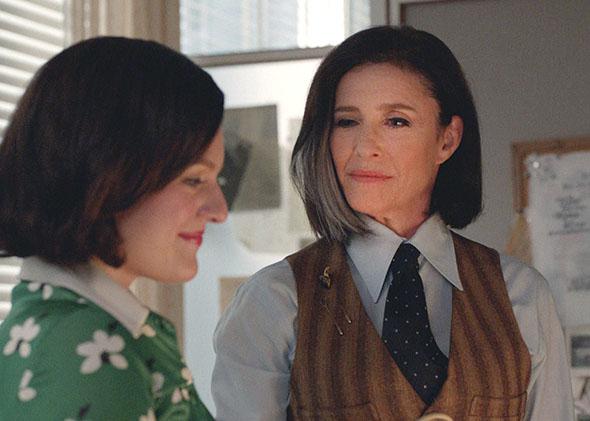Hanna, John:
Well, I misread that one! I thought that Don had grotesquely mistaken obligation for desire when he screwed Waitress Diana in the alley last week, but I was wrong. Diana is still with us, and it turns out she’s all desire: She wants to forget where she came from, she wants to be abused and saved in equal measure, she wants (and thinks she does not deserve) a fresh start.
This episode was called “New Business”: and, as you noted Hanna, it was about new beginnings. It made literal—maybe too literal—the main theme we were discussing before the season began. Is it possible to start over? And how many times can you start over before getting tired of the whole charade? Much was made in the dialogue of the particular ennui of the second divorce: Don, the old hand, reassuring Megan, “This is what [lawyers] do”; Don and Roger communing about their splits from Megan and Jane; Pete asking Don for advice about how to navigate the work world as a divorcé. (The risk: With a date, “you don’t know how much they’re going to drink and you end up with a floozy.” The solution: golf!)
There were sprouts of “marvelous hope” beneath the encrusted cynicism of the doubly divorced. Don in particular displays real empathy in his pursuit of Waitress Diana, skipping work to console her when she reveals she had a daughter who died, taking a moment to clarify that the appearance of his ex is nothing to worry about: “I think if I were you, this would bother me, and it shouldn’t, because it’s almost over.” He even brings her a New York guidebook, as though grief could be countered with choice restaurant recommendations. And Don’s not the only one hoping. Betty is enrolling in a psychology master’s program, the better to help the people who “seek me out to share their confidences.” Megan decides a million bucks will help her move on. Marie Calvet abandons her husband for a romp or more with Roger.
But Waitress Diana, at least in this episode, makes a different choice. She is sad about the daughter she lost, and guilty about the one she abandoned. And although, like Dick Whitman, she has a chance to start over—and could soon be decorating Don’s newly vacant pad and sprucing up his balcony of brooding and gloom—she rejects the opportunity: “When I was with you, I forgot about her. I don’t ever want to do that.” We’ll see how Don takes the rejection, and whether he keeps stalking her at eating establishments around the city.
As for old Harry Crane: There really is a spinoff show to do here about the moral degeneration of Harry. Remember when he was just a put-upon nebbish back in Season 1? Since then he’s become an unctuous, soulless weasel. It could be like Breaking Bad without the gunplay. Although we’ve seen this transformation only from the outside—we experience Harry’s misbehavior primarily as comic villainy, without a lot of insight as to his motivations—I think part of what Weiner is emphasizing here is one of the downsides of loosening social codes. The repressed ’50s were judgmental and wary. There were rules of behavior and everyone kept an eye on everyone else. As those codes fell away, some people, like our heroes, sought freedom, truth, and inner peace, and others just took advantage of the fact that sex was more available and no one was watching anymore. Harry is one such person. The cloddish obviousness with which he pursues his objective is part of what’s so repulsive, here: “So give me the lay … you know, of the land”; “you’re like Ali MacGraw and Brigitte Bardot had a baby”; “I have a room, upstairs.” But he compounds the error by responding so peevishly to her rejection: “Maybe you’re in this situation”—having trouble finding acting work—“because of how you’re reacting to this.”
And Pima? The thrill in this subplot was encountering a woman with real, unusual, gender-bending power. (So much menswear! I loved how many buttons Stan had to fuss with during their assignation; he was working so hard on her shirt it looked at times like he was typing a letter.) Not since Bobbie Barrett have we met a woman in a business context who seems charged with real clout and authority, and even Bobbie Barrett was just managing her husband’s career. (Bobbie also told Peggy: “Be a woman. It’s powerful in business when done correctly.” Pima seems to have a different solution, which is to be an omnidirectional gender cipher.) This storyline felt slightly compressed to me. Stan is sad that he’s subsumed his art to commerce. He enjoys Pima’s sexual attentions. Peggy does not. Peggy declines to hire Pima again, suggesting that Pima is less of an artist and more of a saleswoman than she’d expected. Was Peggy discomfited by the pass Pima made? Threatened by another woman of authority? Pima acts like the alpha in every room, but throughout the episode she is both supportive of and deferential to Peggy. I couldn’t quite read that scene.
I’ll leave the Pima codebreaking to you, John, but before I do I’ll depart with a few questions:
Why did Don bring clubs back to the office? I thought he was renting them. Did Pete shame him into buying a new set? If so, that was prescient, since it seems like they are now Don’s sole possession.
I felt like Weiner was winking to us viewers when Megan called Don an “aging, sloppy, selfish liar.” Finally, we can all agree! But do you know exactly why Megan thinks Don ruined her life? I had seen their dissolution as fairly mutual until this episode.
What was up with Roger’s duet of secretaries?
That should be fascinating for everyone involved,
Julia
Read the previous entry by Hanna Rosin. Read the next entry by John Swansburg.
